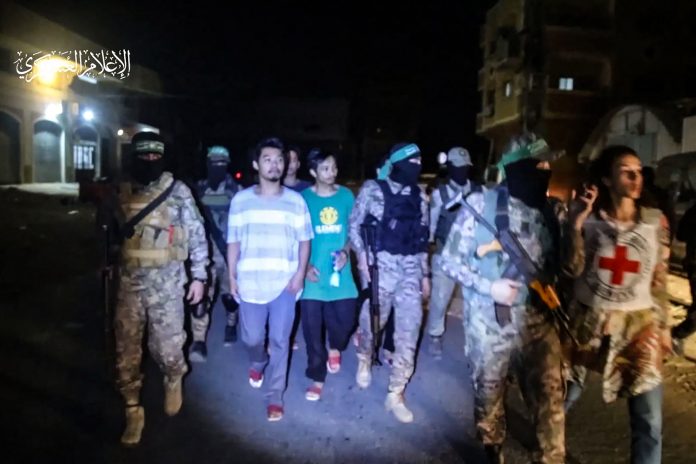The truce between Hamas and Israel continues, with a third group of hostages to be released, but Hamas accused Israel of violating the agreement, killing the highest-ranking militant.
Early Sunday, the second group of hostages was released during the second stage of the prisoner exchange, but also emphasised the fragility of the situation due to the rather slow process.
Hamas later announced the death of one of its top commanders, Ahmed al-Ghandour, who was in charge of northern Gaza and a member of Hamas’ top military council. Remarkably, he was however the highest-ranking militant known to have been killed during the conflict.
Consequently, the exchange was postponed Saturday evening after Hamas accused Israel of violating the agreement.
Late Saturday, Qatar and Egypt, which are mediating the talks with Hamas, announced that the obstacles to the exchange had been overcome. As a consequence, Hamas released 17 hostages, including 13 Israelis, and Israel freed 39 Palestinian prisoners.
The four-day ceasefire, which began on Friday, was brokered by Qatar, Egypt and the U.S. Hamas must release at least 50 Israeli hostages and Israel must release 150 Palestinian prisoners. All are women and minors.
Still, the pause has given some respite to the Palestinians. Rocket attacks by Israel stopped, but that doesn’t make things any better, as entire neighbourhoods in and around the Gaza Strip are destroyed by airstrikes that hollowed out buildings and left drifts of debris in the streets.
The result of the displacement has also been that many residents who fled their homes because of the Israeli offensive are now eager to return to check whether their homes are intact.
Many are desperate to return to their homes, but they open fire on anyone approaching from the south, said Rami Hazarein, who fled from Gaza City last month.
There are still many Palestinians in Israeli prisons, including those involved in deadly terrorist attacks. In the West Bank town of Al-Bireh, for example, freed teenagers paraded through the main square, where they waved Palestinian flags as well as green Hamas banners and yellow banners of the rival Fatah party led by President Mahmoud Abbas.
Israel, on the other hand, while supporting a one-day truce extension for every additional 10 hostages released, still maintains that the offensive will continue shortly after the truce ends.
The war in Gaza is accompanied by an upsurge in violence in the Israeli-held West Bank, as European politicians have repeatedly called on Israel to abandon this method of warfare.
